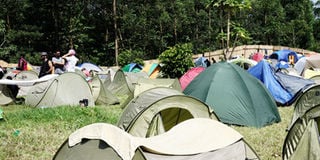Getting down to business, the Nyege Nyege way

Tents where revelers camped during the at the Nyege Nyege Festival. This is one of the most lucrative businesses during the Festival. PHOTO BY Andrew Kaggwa
What you need to know:
The reason for starting Nyege Nyege Festival came out of an urge to throw a party. Yet years later, the festival has fast become Jinja’s biggest event, not only attracting tourists to Uganda’s oldest city, but also creating employment for many, writes Andrew Kaggwa.
The neon, drinks and people; there are many ways one can always define the annual music fest that is Nyege Nyege.
The Guardian has often called it a festival that gives a chance to the other music; electronic, techno, garage, house and everything that is not mainstream. Yet, beyond the sound Nyege Nyege purports to promote, it is \ a platform that keeps giving not to only the revelers but also those that stay around Nile Discovery where the festival happens.
Over the past four years, the festival has created an economic eco-system that has started benefiting the locals and created employment for others, when it happens.
“Nyege Nyege is a time for us to make insane money,” says a Boda boda rider that refers to himself as Badru. Badru last year bagged Shs300,000 over the four days and managed to replace both his tyres.
But the money changing hands – both that is known or even undeclared – is beyond the few boda boda riders at the Njeru stage to the Nile Discovery, over the years. As the festival became a thing, with it came needs.
Home for business
For instance, last year, people in the neighbourhood turned their compounds into parking lots and cars paid between Shs10,000 and Shs20,000. Others had a round figure of Shs30,000 for all the three days and as you could imagine, the service was a hit.
“We had about ten cars where each had paid Shs30,000 to stay for the entire festival. Some left on Saturday and their spots were filled immediately,” says Brenda Nakitto, one of the residents in Njeru, close to the festival grounds.
This year though, Nakitto and many of her friends will not be smiling to the bank, in fact, they may count losses.
After weeks of getting their compounds ready for the big weekend, they learnt that the City Council was intending to gazette the municipality to work as a parking space.
If that wasn’t enough, police trucks were used to block the road to the grounds. This meant that only a few cars belonging to mostly service providers could access the grounds.
This left Nakitto and the neighbourhood devastated. It is said some of these people had even hired these grounds.
But like the years before, the neighbourhood did more than just offer packing space, some turn their backyards into all sorts of things ranging from restaurants to camping sites.
Last year, a day to the festival, Lake View Camping Site was born; started by siblings that intended to curate an intimate experience different from that at the main ground.
They had started with five campers, yet by Friday, their compound had sold out, and their guests had a view of the river but above all had access to a tent, mattress, breakfast, electricity and running water without queuing for it.
The experience was worth Shs50,000 per night.
Even homes that did not necessarily turn themselves into camping areas found ways of involving themselves into the festival, for instance, shops added a service of charging phones at Shs1,000 and Shs5,000 for cameras and laptops.
This year, a new business Charginga Ko was charging revelers Shs5,000, a round fee to charge both phones and laptops.
Camping and Tents
But if there is a business that has come to light thanks to the festival, it is camping and tents.
Beatrice Olakha, the proprietor of Errands Uganda, was already doing errands for people. After handling tents for Bayimba Festival early last year and later being sub-contracted for Nyege Nyege, offering camping services, she has since taken over all the things she used to do.
Last year, she was the sole supplier of tents and mattresses for Lake View Camping Site. This year, Njeru had banners of over ten service providers all dealing in tents and mattresses.
Dinning
There is never a festival without food. Nyege Nyege in the same way is at one point a food affair.
According to one of the vendors, this year, they paid Shs4 million to have food stalls. Because of this, the famous rolex makers were left in the cold as they couldn’t afford that.
In fact, most people making rolex were on the ground’s outskirts.
Besides those accredited on the festival grounds, some locals used the opportunity to curate restaurants that sold food to people that could not afford food on the ground.
Where a rolex on the main ground went for Shs7,000, outside the festival grounds, it was at Shs3,000.
Besides the food, some of the houses curated their own entertainment that included a silent disco where revelers paid Shs10,000 for access.
Since last year, the festival has added an extra day extending itself from three days it used to run for the first three editions to four.
Each of the days are charged differently especially for those that are not willing to buy a full festival ticket and of course, an extra day in business for the locals and the entire Nyege Nyege eco system.




